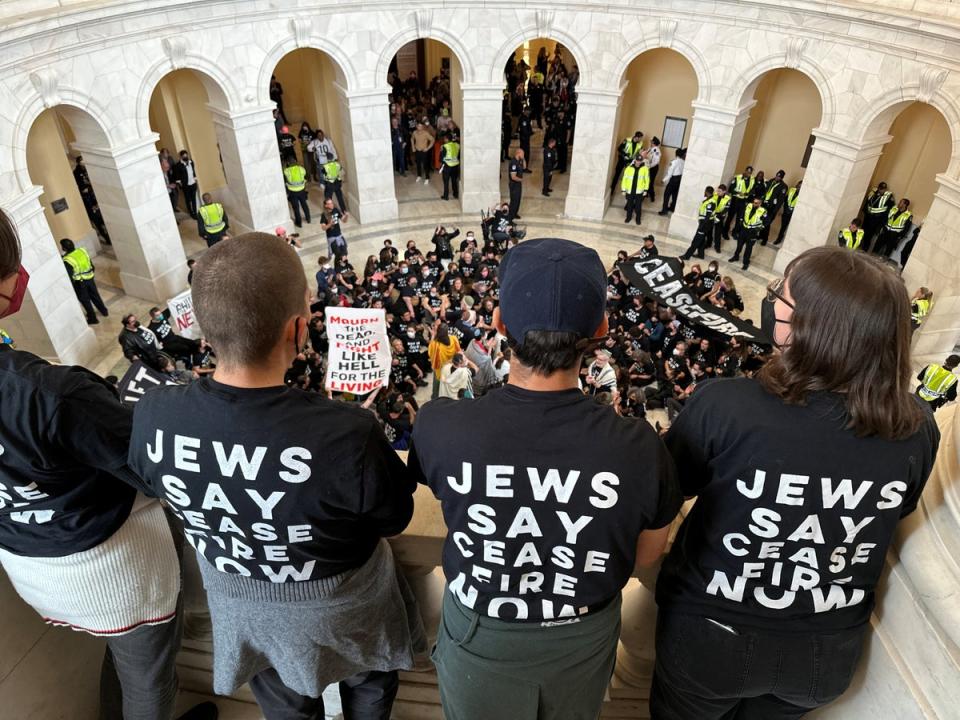House approves resolution that declares ‘anti-Zionism is antisemitism’
- Oops!Something went wrong.Please try again later.
The US House of Representatives has passed a resolution that explicitly labels anti-Zionism as antisemitism, after warnings from senior Jewish members of Congress and opponents of the measure who fear that it dangerously conflates criticism of Israel with anti-Jewish attacks amid Israel’s siege of Gaza.
The measure passed the House on Tuesday with support from 311 House lawmakers, including 95 Democratic members. There were only 14 votes against the resolution. Ninety-two members voted “present”.
Democratic US Rep Jerry Nadler of New York, the most senior Jewish member of the House, called the measure “another attempt in a long series of veiled efforts by the GOP to weaponise Jewish lives for political gains” in his remarks from the House floor on Monday night.
House Resolution 894 “clearly and firmly states that anti-Zionism is antisemitism,” creating a definition that opponents warn could strike at First Amendment protections while broadly smearing support for Palestine or criticism of Israel as an anti-Jewish attack. Critics have also argued that codifying support for Zionism and tying one’s religion to a government is itself antisemitic, and could feed anti-Jewish hate.
A draft of the four-page measure was widely condemned across social media before it was introduced and debated on the House floor on Monday night. The vote was postponed until Tuesday afternoon.
“These authors, if they were at all familiar with Jewish history and culture, should know about Jewish anti-Zionism that was and is expressly not antisemitic,” Mr Nadler said in remarks on Monday. He added that the measure ignores certain Hasidic communities, progressive Jewish groups and others that “have held views that are at odds with modern Zionist conception.”
The resolution was introduced by Republican US Reps David Kustoff and Max Miller. Mr Miller told Fox News last month that he refuses to “call it the Palestinian flag because they’re not a state, they’re a territory that’s about to probably get eviscerated and go away here shortly, as we’re going to turn that into a parking lot.”
In his comments on Monday, Mr Nadler accused Republicans of exploiting reports of antisemitism after Israel’s ongoing siege “to try to inflict inter-party political damage.”
“Or we can rise to the occasion and do something real and powerful to actually help the Jewish community,” he said.
The conflation of anti-Zionism with antisemitism is “either intellectually disingenuous, or factually wrong,” he added.
The @HouseGOP is attempting to weaponize Jewish lives for political gain. The explosion of antisemitism worldwide deserves a bipartisan, all of government approach. pic.twitter.com/PdLxHNlURL
— Rep. Nadler (@RepJerryNadler) December 5, 2023
The federal government has relied on the nonbinding working definition of antisemitism as adopted by the 31-member International Holocaust Remembrance Alliance, which states that “denying the Jewish people their right to self-determination, e.g., by claiming that the existence of a State of Israel is a racist endeavor,” is antisemitic.
The resolution from Republican lawmakers, however, would state explicitly that anti-Zionists are antisemitic.
“Just want to be clear: this is a cynical effort to conflate criticism of the government of Israel with anti-semitism,” said Indivisible co-director Leah Greenberg. “It’s not about protecting Jews. It’s about shutting down dissent. And in doing so it makes all of us less safe.”
Jewish Voice for Peace Action, the political advocacy wing of the anti-Zionist Jewish group, said the resolution “threatens both Jewish and Palestinian safety, ignores the threat of rising white nationalism, and is a direct attack on free speech.”

“Every member of Congress should vote against it,” the group added.
Mr Nadler said the GOP has “shown themselves fundamentally unserious about combatting antisemitism” and questioned whether congressional Republicans have done anything to adopt the White House plan to combat antisemitism or fund federal civil rights offices.
The measure itself also avoids mentioning “the obvious instances of antisemitism coming from their own leaders” and “implicitly compares some peaceful protesters with the January 6 insurrection,” he said.
“I suppose they have their own reasons for that,” Nadler continued.
On Tuesday, Democratic US Reps Nadler, Dan Goldman and Jamie Raskin urged the House to reject the resolution and instead adopt a measure to commit Congress to a national strategy against antisemitism.
“The threat of antisemitism and the safety of Jewish lives is not a game,” they wrote. “It is beneath the dignity of Congress and it is an affront to Jews everywhere to treat rising antisemitism as an opportunity to create partisan division with conceptual confusion.”
Republicans’ latest resolution follows last week’s passage of House resolution 888, which passed with overwhelming support from lawmakers from both parties with only one “no” vote: Republican US Rep Thomas Massie.
The resolution (titled “Reaffirming the State of Israel’s Right to Exist”) condemned Hamas attacks and recognised “that denying Israel’s right to exist is a form of antisemitism.”
Mr Massie said he voted against the measure “because it equates anti-Zionism with antisemitism.”
“Antisemitism is deplorable, but expanding it to include criticism of Israel is not helpful,” he added.
Mr Massie was also the only Republican to vote against House Resolution 894.
Democratic US Rep Ilhan Omar said in a statement that “the extreme and cynical Republican resolution does nothing to combat antisemitism, relies on a definition that conflates criticism of the Israeli government with antisemitism, paints critics of the Israeli government as antisemites and falsely states that anti-Zionism is antisemitism.”
“We must stand against any attempt to define legitimate criticism of this war and the government perpetrating it as antisemitism,” she added.
More than 15,000 people have been killed in Gaza following Israel’s retaliatory siege and ongoing bombardments in the wake of Hamas attacks on 7 October that killed 1,200, according to Gaza’s health ministry.
Sixty House members and three US senators have publicly supported calls for a ceasefire in the war, while polls have shown that roughly two-thirds of American voters support a ceasefire.

